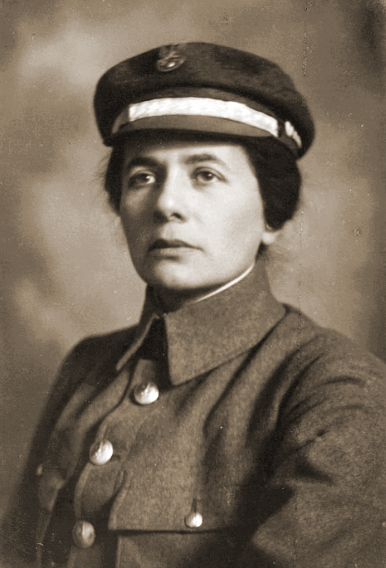In November 1918, Aleksandra Zagórska’s son, 14-year-old Jurek Bitschan, was killed by a bullet in Lwow (today’s Lviv) during fighting with the Ukrainians. Zagórska’s personal tragedy gave rise to the Women’s Voluntary Legion, which she organised in the same year. Its members took up arms against the enemy. They also proved themselves in battles against the Bolsheviks in 1920.
At the end of 1918, Zagórska formed the Women’s Civic Militia, whose task it was to maintain order in Lwów, which was full of Ukrainian militiamen and criminals, released from prison, loitering around the city. On the basis of this formation, she formed the Women’s Voluntary Legion (OLK), which went down in legend as an extremely militant unit of ‘amazons’.
Zagórska was born in 1882 in Lublin. She studied chemistry at Jagiellonian University. In 1905, she joined the Fighting Organisation of the Polish Socialist Party where she was involved in the manufacture of bombs used to assassinate tsarist officials.
From the very beginning of her organisational activities, she brought together women who, like her, were devoted to the Polish Cause. First, on her initiative, women’s squads of the Polish Military Organisation were formed, and during the First World War, she organised the women’s intelligence service of the First Brigade of the Polish Legions.
The OLK was famous for its great discipline. The reason for its introduction was the concerns often formulated about female legionnaires about their conduct. Therefore, in order to join this formation, female candidates had to present a school certificate, a medical certificate of good health and as many as two certificates of morality, issued by the police and the parish priest. The penalties for misconduct were severe: for talking to a soldier in the street, a female legionnaire went to jail for a fortnight, and for disrespecting her uniform she was threatened with 25 rods in front of the entire troop.
The fame of the Lwów women legionnaires spread throughout the country. In 1919, they fought not only in Lwów but also in Vilnius, where the local female volunteers, under the command of Lieutenant Wanda Gertz, took part in the defence of the city against the Bolsheviks. During the war with Bolshevik Russia, the OLK included 2,500 women.
One of the legionnaires was the first female general of the Polish Army in Polish history, Maria Wittek, and Stanisława Paleolog – the founder of the Women’s Police in the Second Republic of Poland.
The OLK was disbanded in 1922 when the borders of the independent Polish state were no longer under threat. In the autumn of 1921, at her own request, Zagórska asked to be released from service. She was active in the Association of Polish Legionnaires.





